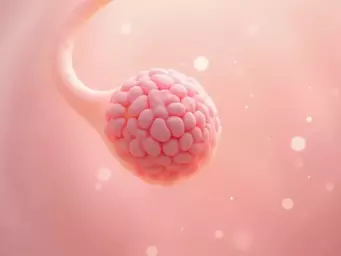Managing Ovarian Cyst Bloating Naturally

Posted on: 2025-10-20
By: Edyta Drabek
As you navigate the challenges of ovarian cysts, understanding the impact on your body can empower you. Did you know that many women will experience these fluid-filled sacs at some point in their lives? Gaining knowledge about the causes and management of symptoms can make a significant difference in your journey toward relief.
What You Will Learn
- Bloating from ovarian cysts can result from the size of the cyst, hormonal changes, and dietary factors.
- Common symptoms include abdominal pain, irregular menstrual cycles, nausea, and bladder difficulties.
- Incorporating regular gentle exercise and stress management techniques can help alleviate symptoms.
- Keeping track of your symptoms and diet can provide valuable insights for better health management.
Managing Ovarian Cyst Symptoms
Understanding the key areas that contribute to ovarian cyst discomfort and how lifestyle changes can help in their management. For more detailed information on various approaches, consider exploring our guide on managing ovarian cyst discomfort.
Causes of Bloating
Bloating from ovarian cysts can be influenced by:
- Cyst size & abdominal pressure
- Hormonal fluctuations (fluid retention)
- Dietary factors
Symptoms & When to Seek Help
Monitor for these symptoms:
- Abdominal pain or discomfort
- Irregular menstrual cycles
- Nausea or vomiting
- Difficulty emptying bladder
- Seek help for severe or persistent pain.
Lifestyle Changes for Management
Key areas to focus on for relief:
- Diet: High-fiber, nutrient-rich foods
- Exercise: Gentle activity (walk, yoga)
- Self-Care: Stress reduction, hydration
Ongoing Self-Care & Monitoring
Tools for tracking your symptoms:
- Symptoms: Discomfort, pain levels
- Diet: New foods, reactions
- Emotional well-being: Stress, mood
- Explore support groups & alternative therapies.
Understanding Ovarian Cyst Bloating and Swelling
Experiencing bloating and swelling due to ovarian cysts can be uncomfortable and frustrating. It’s essential to understand what causes these symptoms and how they relate to your overall health. Ovarian cysts, which are fluid-filled sacs on the ovaries, can lead to a variety of sensations, including pressure and discomfort in the abdomen. You’re not alone in this journey, and being informed can empower you to manage your symptoms more effectively.
So, what exactly causes this bloating? It can stem from the size of the cyst, hormonal fluctuations, or even dietary choices. As we explore these factors, remember that knowledge is your ally in combating discomfort.

What Causes Bloating in Ovarian Cysts?
Bloating associated with ovarian cysts often results from an increase in abdominal pressure due to the cyst itself. As the cyst grows, it can push against nearby organs, leading to feelings of fullness or swelling. Additionally, hormonal changes during your menstrual cycle can contribute to fluid retention, exacerbating these symptoms. Understanding these changes can help you better manage your condition, similar to how one might approach natural remedies for ovarian cyst pain.
- Size of the cyst: Larger cysts can cause more noticeable bloating.
- Hormonal fluctuations: Changes in estrogen and progesterone can impact fluid retention.
- Dietary factors: Certain foods may increase bloating or exacerbate discomfort.
By recognizing these causes, you can better understand your body and react accordingly. If bloating becomes persistent or particularly painful, it's crucial to reach out to a healthcare provider for advice.
Common Symptoms and When to Seek Help
Along with bloating, ovarian cysts may present several other symptoms. You might experience:
- Abdominal pain or discomfort
- Irregular menstrual cycles
- Nausea or vomiting
- Difficulty emptying your bladder
Identifying these symptoms can help you determine when to seek professional guidance. If you notice severe pain, or if your symptoms significantly impact your daily life, don't hesitate to reach out for help. Remember, early intervention can often lead to better management of your condition!
How Lifestyle Changes Can Help Manage Symptoms
Making small adjustments to your lifestyle can have a big impact on how you feel. For instance, incorporating regular physical activity, practicing stress management techniques, and focusing on a balanced diet can alleviate discomfort. Here are a few lifestyle changes to consider:
- Engage in regular, gentle exercise like walking or yoga.
- Incorporate stress-reducing practices, such as mindfulness or meditation.
- Focus on a diet rich in whole foods, especially those high in fiber.
These changes can not only help in managing your symptoms but also promote overall well-being. Remember, at Ovarian Cysts Wellness, we’re here to support you on your journey to balance and self-care. You have the power to influence how you feel!
Pro Tip
Did you know? Incorporating a diet rich in anti-inflammatory foods can significantly help in managing the discomfort caused by ovarian cysts. Foods like turmeric, ginger, and leafy greens are not only nourishing but can also help reduce inflammation and promote overall well-being. Consider adding them to your meals for better symptom management!
Frequently Asked Questions About Ovarian Cysts and Bloating
Q1: Why do ovarian cysts cause bloating?
A1: Bloating from ovarian cysts can result from the physical size of the cyst pressing on abdominal organs, hormonal fluctuations leading to fluid retention, and sometimes dietary factors that exacerbate discomfort.
Q2: What are the common symptoms of ovarian cysts?
A2: Common symptoms include abdominal pain or discomfort, irregular menstrual cycles, nausea or vomiting, and difficulty emptying the bladder. Bloating and swelling are also frequently reported.
Q3: What lifestyle changes can help manage ovarian cyst symptoms?
A3: Lifestyle changes such as engaging in regular gentle exercise (like walking or yoga), practicing stress management techniques (like mindfulness or meditation), and maintaining a diet rich in whole, high-fiber, and anti-inflammatory foods can significantly help in managing symptoms.
Q4: When should I seek medical help for ovarian cyst symptoms?
A4: It is crucial to consult a healthcare provider if you experience severe pain, persistent or worsening bloating, significant changes in your menstrual cycle, or any unusual bleeding or discharge.
Q5: How can tracking my symptoms help in managing ovarian cysts?
A5: Tracking symptoms, diet, and emotional well-being using a journal or app can help you identify patterns, understand what exacerbates or alleviates your symptoms, and provide valuable information for your healthcare provider to better diagnose and manage your condition.
Summarizing Effective Lifestyle Changes for Ovarian Cyst Management
Managing ovarian cysts often involves a holistic approach that includes diet, exercise, and self-care. It’s crucial to recognize how these elements work together to promote overall wellness and comfort. I’ve seen firsthand how small, consistent changes can lead to significant improvements in symptoms and daily life! Here are some key takeaways that can guide your journey toward relief:
- Focus on a nutrient-rich diet: Incorporate high-fiber foods, lean proteins, and anti-inflammatory ingredients.
- Stay active: Gentle exercises like yoga and walking can enhance circulation and reduce discomfort.
- Prioritize self-care: This includes relaxation techniques and proper hydration to support your body.
As we discuss these elements, remember that every woman’s experience with ovarian cysts is unique. It’s about finding what works best for you and embracing it as a part of your self-care journey!

Key Takeaways on Diet, Exercise, and Self-Care
Let’s delve a little deeper into how you can implement these lifestyle changes effectively. Here are my top recommendations:
- Diet: Focus on fresh, whole foods that are rich in vitamins and minerals. Foods like leafy greens, berries, and nuts can help support hormonal balance.
- Exercise: Incorporate at least 30 minutes of activity into your daily routine. This can be as simple as taking a brisk walk or following a gentle yoga class online.
- Self-Care: Engage in mindfulness practices such as meditation or deep breathing exercises to manage stress and promote relaxation.
Implementing these strategies can create a solid foundation for managing your ovarian cyst symptoms. Remember, it’s not about perfection but rather about progress and what feels right for you!
Encouraging Ongoing Self-Care and Monitoring
As you embark on this journey, ongoing self-care and monitoring are essential. Regular check-ins with your body can help you become more attuned to your symptoms and needs. Keeping track of your experiences will empower you to take proactive steps in your wellness journey.
When to Consult a Healthcare Provider for Persistent Symptoms
It’s important to recognize when to seek help from a healthcare provider. If you experience persistent or worsening symptoms, consider reaching out. Here are some signs that indicate it’s time to consult a professional:
- Severe pain that disrupts daily activities
- Persistent bloating or changes in your menstrual cycle
- Any unusual bleeding or discharge
Your health is a priority, and seeking assistance when needed is a crucial part of managing ovarian cysts effectively. Don’t hesitate to advocate for yourself!
Using Tools for Symptom Tracking and Self-Assessment
To make informed decisions about your health, consider using tools for tracking your symptoms. This could be a simple journal or a dedicated app. Here’s what to include:
- Symptoms: Note any discomfort, bloating, or pain levels.
- Diet: Keep track of what you eat, especially new foods introduced to your diet.
- Emotional well-being: Monitor your stress levels and mood changes.
By keeping a record, you’ll not only see patterns but also provide valuable information to your healthcare provider when discussing your condition. This approach is key to understanding your unique experience, much like understanding the various types of ovarian cysts and their implications.
Exploring Alternative Therapies and Support Groups
Consider exploring alternative therapies and connecting with support groups. Many women find comfort in sharing their experiences and learning from one another. Here are some options to explore:
- Support groups: Look for local or online communities where women discuss their experiences with ovarian cysts.
- Alternative therapies: Consider acupuncture, herbal remedies, or nutritional counseling as adjuncts to your care.
- Educational resources: Websites like Ovarian Cysts Wellness offer articles and tips for managing your health.
Connecting with others and seeking additional resources can help you feel less alone in your journey. Remember, you’re part of a community that understands and supports you!
Recap of Key Points
Here is a quick recap of the important points discussed in the article:
- Bloating Causes: Bloating can stem from the size of ovarian cysts, hormonal fluctuations, and dietary choices.
- Common Symptoms: Symptoms include abdominal pain, irregular menstrual cycles, nausea, and difficulty with bladder emptying.
- Lifestyle Changes: Engaging in gentle exercise, practicing stress management, and maintaining a balanced diet can help manage symptoms.
- Self-Care Importance: Regular self-care and monitoring can empower you to manage your symptoms effectively.
- When to Seek Help: Consult a healthcare provider if you experience severe pain, persistent bloating, or unusual bleeding.
 Understanding ovarian cysts can feel overwhelming, especially if you're navigating discomfort on you
Understanding ovarian cysts can feel overwhelming, especially if you're navigating discomfort on you
 Building your personalized self-care kit can be a transformative experience, especially during chall
Building your personalized self-care kit can be a transformative experience, especially during chall
 Many women are unaware that ovarian cysts are a common issue, with many experiencing them at some po
Many women are unaware that ovarian cysts are a common issue, with many experiencing them at some po



